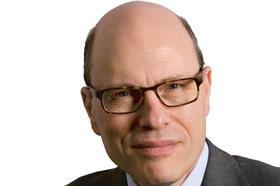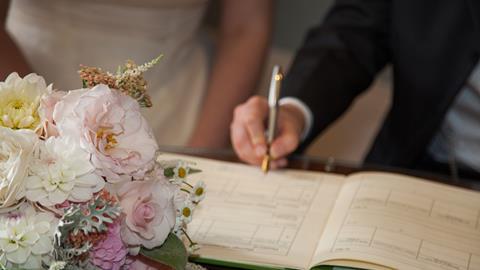One of the advantages of a Jewish wedding is that – in the somewhat tautologous language of the old Martini advertisements – you can have one ‘any time, any place anywhere’. That privilege may be extended to everyone marrying in England and Wales if the Law Commission endorses provisional proposals it made two years ago and ministers accept recommendations to be published by the commission next Tuesday.

Although I am a non-executive member of the commission board, I have not read – or been briefed on – its forthcoming report. So this piece is based on the 2020 consultation paper.
In it, the government’s law reform advisers proposed fundamental changes to a structure that dates back to Lord Hardwicke’s Clandestine Marriages Act of 1753. That required just about everyone except Jews and Quakers to marry according to Anglican rites. Other religious and civil ceremonies have been permitted since 1836 but these weddings are still restricted by 19th-century formalities. You can’t generally be married at home, for example, and Anglican weddings can’t take place in the evening.
Those rules could be relaxed so that couples could choose a ceremony and a location that was meaningful to them – on a cruise ship, for example, or in a garden. Free public access would no longer be necessary in cases where this is currently required.
Some way of authorising weddings is clearly needed, though, and the commission has provisionally proposed basing this on the person who would be authorised to officiate at a wedding – the officiant. That individual would not necessarily conduct or lead the ceremony. But an officiant would have to be present and would be ‘responsible for upholding the dignity and solemnity of marriage’.
Who, then, could be made an officiant? Clearly, they would include registration officers who currently conduct civil weddings – and only one would be needed under these proposals. All Anglican clergy would qualify by virtue of their ordination. Beyond that, individuals would have to be nominated and approved.
'Commissioners believe their provisional proposals would make it easier for couples to have a legally binding wedding at a venue and with a ceremony that is meaningful to them and their faith'
And who could nominate them? Religious bodies, certainly – although the General Register Office might have to decide whether a particular faith group met the criteria. But what about secular groups, such as humanists?
That is not a question ministers have asked the commission to decide. But the arrangements it outlined would certainly allow for non-religious belief organisations to nominate officiants in the same way as religious groups.
Wedding officiants would have to be carefully trained and regulated. Their duties would include ensuring that the parties had freely expressed consent to marry each other at the ceremony; that there were two witnesses; and that the parties had signed a document confirming their consent. That consent could have been given orally during the ceremony (‘I do’) or symbolically (for example, by accepting a wedding ring).
First, though, the parties would need to have given advance notice of their intention to marry – normally four weeks, but 10 weeks for some foreigners and immigrants. The initial application could be made remotely provided it was followed by an in-person meeting with the registration officer ahead of the wedding. But there would no longer be any residency requirements. Checks would be made and the couples’ names would be published on a website. In its consultation paper, the commission asked for views on whether Anglican preliminaries, which include the calling of banns, should continue to satisfy the legal requirements.
Advance notice – which may be shortened in urgent cases – is designed to identify any impediments to marriage. Do the parties have capacity? Is it a forced marriage, where one party has not consented? Is it a sham wedding, conducted purely to gain an immigration advantage?
The commission is also concerned about religious ceremonies that do not comply with the legal formalities. Individuals may sometimes be misled into thinking that their marriage is recognised by law.
Commissioners believe their provisional proposals would make it easier for couples to have a legally binding wedding at a venue and with a ceremony that is meaningful to them and their faith. The marriage would be valid if the couple gave notice and consented to be married in the presence of an officiant – or a person believed to be an officiant by at least one of them.
But there would be limits, for example if the couple had not given notice and neither believed that the person celebrating the marriage was legally authorised. This would not be a ‘void’ marriage, under which a party could claim financial relief. It would simply not be a marriage at all.
The big question, though, is whether these proposals, if implemented, will strengthen the institution of marriage and increase the stability of society. Unfortunately, that is not the sort of question a lawyer can answer. What we can expect, though, is that weddings will soon become a lot more fun.
joshua@rozenberg.net
































No comments yet